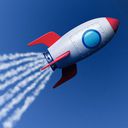Hope during coronavirus: Return to space

Published Date: 5/24/2020
Source: axios.com
It would already be a huge event if Wednesday's SpaceX launch was just the return to launching astronauts on U.S. rockets for the first time in nearly a decade.But throw in the fact that it will also be the first orbital launch of U.S. astronauts by a private company — and the fact that it's happening in the middle of a pandemic — and you have a seismic historical event. And it just might give Americans something inspiring to talk about at a time when everyone needs it.That's assuming the launch is successful. If it isn't, it could turn into yet another blow to the nation's morale, rather than a break from all of the bad news that surrounds us.Why it matters: The launch to the International Space Station will mark the first crewed rocket launch from U.S. soil since the end of the space shuttle program in 2011. That nine-year gap marks the longest stretch of time since Alan Shepard's first spaceflight in 1961 that the U.S. hasn't had the ability to launch its own astronauts.And yes, this launch is going ahead even though most of the U.S. is still locked down by the coronavirus.How is that possible? By keeping the crowds away, quarantining the astronauts — and testing them regularly so they don't carry the virus to the space station with them.What's happening: Since 2011, NASA has relied on Russia's Soyuz rockets to launch their astronauts to the space station, but this launch is expected to be the beginning of the end of that reliance. NASA chose SpaceX and Boeing to build vehicles to fly NASA astronauts to the station in 2014, kicking off the Commercial Crew program. Now, a Crew Dragon spacecraft carrying NASA astronauts Doug Hurley and Bob Behnken is expected to take flight atop a Falcon 9 rocket on Wednesday from Florida."This is a new generation — a new era — in human spaceflight," NASA administrator Jim Bridenstine said during a press conference in early May.The big picture: The space program has provided this kind of hope during dark times for Americans before. As the Apollo 8 capsule orbited the Moon in 1968 on Christmas Eve, the astronauts
aboard read from the book of Genesis as millions of people watched back on Earth. The broadcast provided a welcome respite to a tumultuous year that included the assassinations of Robert Kennedy and Martin Luther King Jr."This is still something that we're going to be successful at, and we're going to do it in the face of the pandemic," Behnken told Axios during a press conference on Friday.Yes, but: This won't be the unbridled, patriotic moment that anyone was expecting when SpaceX and Boeing were announced as NASA's crewed launch partners. Usually, crowds of thousands, if not hundreds of thousands, flock to Florida's Space Coast to try to get a glimpse of a crewed flight as it takes off. This time, however, NASA is asking that members of the public stay home and join in online instead of traveling to Kennedy Space Center for the launch in order to help protect their staff and others from possible exposure to the virus. Between the lines: This launch will also mark the first time a private company using its own spacecraft and rocket design has lofted people to orbit, heralding in the dawn of a more mature space industry and a new age for spaceflight in the U.S.While NASA's space shuttle was built by private companies under contract with the space agency, that program ended up costing NASA more than $1.5 billion per flight.By contrast, SpaceX's development of the Crew Dragon — which is a far less complex vehicle than the shuttle — cost the agency about $1.7 billion even with years of delays.The company will also be able to manufacture and use these spacecraft to fly private astronauts and even tourists to the station — and eventually beyond. (Tom Cruise reportedly hopes to shoot a movie with SpaceX on the station at some point.)It's all part of NASA's grand plan to become a buyer of services in low-Earth orbit instead of a provider, allowing the agency to focus on other, bigger goals like getting humans to Mars.The bottom line: If SpaceX can pull it off, its first crewed flight next week will mark a beacon of hope in an otherwise dark time for the world.